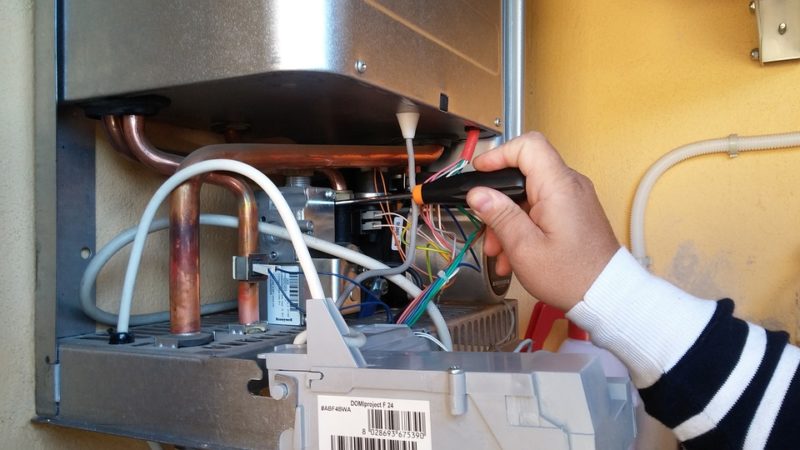Have you ever wondered why is my water heater not working? No more worries you have arrived at the right place. The loose in-line valve, the damaged heating element, or the damaged relief valve are the primary cause of your water heater not working correctly.
A faulty in-line valve is a typical source of water tank leakage. It is a lever situated just at the top of the tank and therefore is designed to turn on or off the water flow. You’ll have to tighten the screw that keeps the roller bearings or in-line faucet in place to remedy the issue, and it also disturbs the relied valve to work correctly.
If you were using an electric heater, a damaged heat source is the most common reason for a shortage of hot water. When a heat source fails, you’ll have almost no heated water for bathing, washing, and doing housework. Stay in touch to learn more!
Reasons Why My Water Heater Not Working
The water heater is a piece of necessary equipment for every household in winters, taking a bath, washing clothes and other housework where the use of water is needed becomes difficult if your water heater was not working correctly, there are many reasons we will discuss below to help you out why is my water heater not working?
#1. Water tank leakages
The water tank must be filled for the water heater to function correctly. The water tank is likely leaky if you don’t have warm water. If your water tank is empty, it becomes a severe issue that wastes a lot of energy. Examine the pipelines and the connectors between both the device and its knobs. Inspect the chamber of the reservoir whether these are tight. It’s probably better to upgrade your equipment if there is still water in the room. Here’s how to fix gas water heater.
#2. Faulty gas valve
If you use a gas heater and don’t have any warm water, examine the supply route. Check the gas line if there isn’t enough leakage. It has to be safe and at the proper location. Make sure that the water heater gas is turned on. If the gas line is working correctly, look at the pilot light. You may have to reheat the pilot numerous times. It has to be kept light. If that doesn’t, the gas line, which is obstructing the gas flow, might be blamed.
Spontaneous gas leakage from a water heater is both annoying and hazardous. When you believe gas is escaping, contact your gas provider right once. The expert from the energy company is competent, but his primary goal is not to fix the water heater. His evaluation of the equipment will determine the following stages. If a natural gas leakage occurs, the gas provider will address the problem within their jurisdiction.
#3. Issue of water temperature
We have a temperature of the water concern, which is one of the most prevalent issues about water heaters not operating correctly. This might be due to the water not warming up quickly enough or becoming too warm. For most situations, all you have to do is check the water reservoir and set the thermostat there. It’s possible that it was happened to bump, causing the temperature to shift. In the summer season, it’s also typical to lower the water tank’s temperature to conserve electricity. Increasing the temperature on the thermostat throughout the colder months may meet your needs. If indeed, the water doesn’t heat up when the temperature is raised, you may have a defective thermostat. Its thermostat must be replaced as a remedy.
#4. The pressure of water is low
A broken water heater isn’t necessarily the source of low water pressure. The water flow rate would be stopped before it reaches our bathroom or kitchen surfaces if you reside inside an existing house using shorter water mains. Connecting fresh 2/4 water pipes into your system is the only way to solve the issue of the warm water heater. Trabeculae in water mains are another issue that can negatively influence water pressure. Water collects near the device and can potentially be leaking from the device or pipelines connecting to it, indicating a leakage. In the event of defective faucets, you may simply substitute them or fix them if they’re loose. If your water tank is rusted, you’ll need to replace it.
#5. The water discoloration
If the cause involves water discoloration, it was most likely due to excessive metal concentrations like copper and iron, which lead the pipelines to corrode. Vancouver’s water is classified as ‘tough’ because it includes significant levels of calcium and magnesium, which originate in the Rocky. Installing a water softening system at home is a frequent option. While it’s not harmful to your long-term health, it can cause issues with the drainage system, which can compromise the functioning of your equipment. Know when to replace water heater.
It’s A Wrap!
We were happy to know that you have learned why is my water heater not working? By reading all the reasons mentioned above, you will now easily detect what’s the problem with your water heater. You can solve some issues by yourself, but if the problems like gas leakage or water leakage happen, you need to call an expert. Thank you, friends, for staying in touch with us! Here are the 7 reasons your water heater isn’t working.

